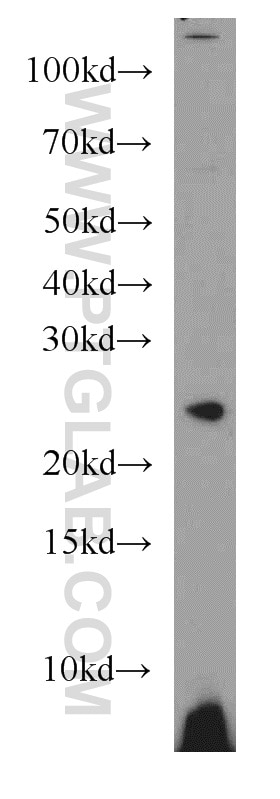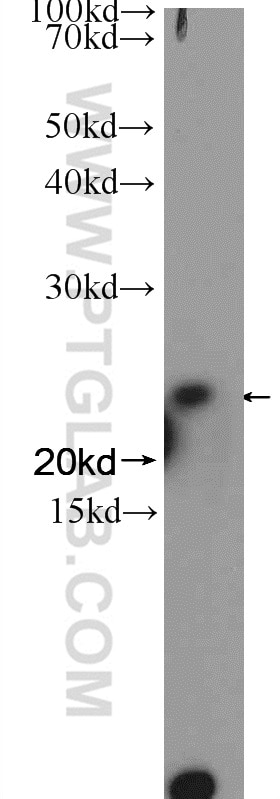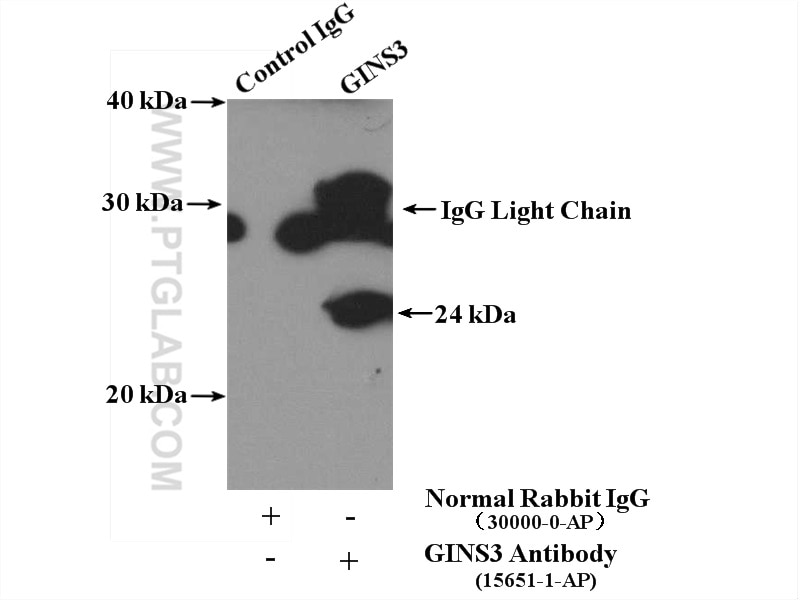Anticorps Polyclonal de lapin anti-GINS3
GINS3 Polyclonal Antibody for WB, IP, ELISA
Hôte / Isotype
Lapin / IgG
Réactivité testée
Humain, souris
Applications
WB, IP, ELISA
Conjugaison
Non conjugué
N° de cat : 15651-1-AP
Synonymes
Galerie de données de validation
Applications testées
| Résultats positifs en WB | cellules Jurkat, cellules NIH/3T3 |
| Résultats positifs en IP | cellules Jurkat |
Dilution recommandée
| Application | Dilution |
|---|---|
| Western Blot (WB) | WB : 1:500-1:1000 |
| Immunoprécipitation (IP) | IP : 0.5-4.0 ug for 1.0-3.0 mg of total protein lysate |
| It is recommended that this reagent should be titrated in each testing system to obtain optimal results. | |
| Sample-dependent, check data in validation data gallery | |
Applications publiées
| WB | See 4 publications below |
Informations sur le produit
15651-1-AP cible GINS3 dans les applications de WB, IP, ELISA et montre une réactivité avec des échantillons Humain, souris
| Réactivité | Humain, souris |
| Réactivité citée | Humain, souris |
| Hôte / Isotype | Lapin / IgG |
| Clonalité | Polyclonal |
| Type | Anticorps |
| Immunogène | GINS3 Protéine recombinante Ag8247 |
| Nom complet | GINS complex subunit 3 (Psf3 homolog) |
| Masse moléculaire calculée | 25 kDa |
| Poids moléculaire observé | 24 kDa |
| Numéro d’acquisition GenBank | BC005879 |
| Symbole du gène | GINS3 |
| Identification du gène (NCBI) | 64785 |
| Conjugaison | Non conjugué |
| Forme | Liquide |
| Méthode de purification | Purification par affinité contre l'antigène |
| Tampon de stockage | PBS avec azoture de sodium à 0,02 % et glycérol à 50 % pH 7,3 |
| Conditions de stockage | Stocker à -20°C. Stable pendant un an après l'expédition. L'aliquotage n'est pas nécessaire pour le stockage à -20oC Les 20ul contiennent 0,1% de BSA. |
Protocole
| Product Specific Protocols | |
|---|---|
| WB protocol for GINS3 antibody 15651-1-AP | Download protocol |
| IP protocol for GINS3 antibody 15651-1-AP | Download protocol |
| Standard Protocols | |
|---|---|
| Click here to view our Standard Protocols |
Publications
| Species | Application | Title |
|---|---|---|
Mol Cell Polε Instability Drives Replication Stress, Abnormal Development, and Tumorigenesis. | ||
J Clin Invest Inherited GINS1 deficiency underlies growth retardation along with neutropenia and NK cell deficiency. | ||
JCI Insight Partial loss-of-function mutations in GINS4 lead to NK cell deficiency with neutropenia | ||
Cell Rep Loss of POLE3-POLE4 unleashes replicative gap accumulation upon treatment with PARP inhibitors |




